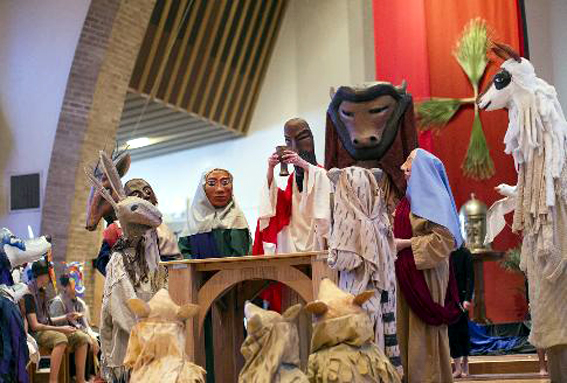IN THE COMMENTS of the post a few days back regarding the 50th anniversary of the new Mass, Richard makes some searching and coherent observations which merit pursuing. Rather than any answer to them being lost in the combox, it seems better to make my brief response to them a post in itself. You may want to read Richard’s comment first.
Richard’s reflections mirror those I elided into the word “curiously,” which is certainly not synonymous with “inexplicably.” I think the lack of mainstream recognition of the anniversary of the new Mass is certainly capable of some tentative explanation.
I agree that the missal of Paul VI is a compromise which pleased neither end of the liturgical spectrum: for the traditionally minded it did violence to the liturgy and introduced a radically new understanding of the role and nature of liturgy; for the progressively minded it failed to take the liturgical bull by the horns and equivocated where it should have innovated.
And I agree that the progressive element among the reforming liturgists saw the 1969 missal as but a stage—a significant one, mind you—in the new project of reconstituting the liturgy as something that continually adapts to the age in which it is celebrated. As we have seen, the result is that the liturgy generally degenerates into reflecting the age rather than speaking to it and sanctifying it. Or more to the point, radical deformations of the liturgy reflect not the face of Christ but the face of the dominant person or clique that imposes them, and so become vehicles not of worship but of narcissism, the cult of self which is the de facto creed of postmodern western society.

So perhaps the relative stability of the 1969 missal renders it no longer useful to this latter mindset, and therefore it merits no celebratory commemoration. Perhaps it has even become a stumbling block. Pope Francis has declared that the post-conciliar reforms are here to stay, which serves to guarantee the stability as normative of the 1969 missal and tends to preclude not only a reform of the reform but also any new, more radical reform.
In essence the reform of the reform is the attempt to grapple with the reality of the liturgical reform and to make it as pastorally effective as the Council wanted it to be.
In essence the reform of the reform is the attempt to grapple with the reality of the liturgical reform and to make it as pastorally effective as the Council wanted it to be. This is the approach of moderate traditionalists. The more radical cry “1962 or bust.” On the other side of the spectrum moderate progressives battle on with altering or adding to the missal to suit a particular occasion but do little else, and are largely fixated on the music and ars celebrandi of the 1970s and the immediate post-conciliar glow in which the new liturgy then bathed. Radical progressives, however, want to spawn new liturgies as “need” or their fancy dictate. For them the Council is no longer really relevant; we have passed beyond the Council and this is now a meta-conciliar age for them. Yet their meta-conciliar church will be smaller and smaller as it becomes more and more determined by an increasingly restless and self-loathing society rather than by scripture, tradition and the living teaching authority of the Church.
For them the Council is no longer really relevant; this is now a meta-conciliar age for them.
St Benedict would probably identify the vice that afflicts whole swathes of the Church as accidie (L. acedia), the noon-day devil which Aldous Huxley accurately described as “a mixture of boredom, sorrow and despair” marked by a desire to be “out of the place in which one happens at the moment to be,” an affliction fed by the “restlessness of modern life” spawned by a century [he speaks in the 20th but the 21st clearly has run further along this path] in which “disillusionments followed on one another’s heels with…un-intermitted rapidity.” We are rootless and thus heartless, replacing self-sacrifice with self-service, with self as the only moral absolute, its inescapable subjectivity and impermanence denying the absolutism it demands for itself. Its secondary absolute, novelty, suffers the same inherent flaw.
Which is why, to get back to the liturgy, be it in the moderate or the more radical form, tradition will win. It always does. Without it Catholicism ceases to exist. We do not even need to cite doctrine for this conclusion; history is warrant enough.
The Carthusian motto is Stat crux dum volvitur orbis—which one can loosely but sensibly translate as “while the world spins the Cross stands firm.” What is the Mass—what should it be—if not the Cross standing firm in this spinning, dizzying world.
Pax.
Brief but very cogent! Thank you, Father, for beautifully stating the case for tradition.
Fr. Hugh Somerville-Knapman, OSB,
I would like to contact you via email. Please reach me at contact(at)bigpulpit(dot)com.
Nothing urgent, but certainly fun & interesting.
In Jesus, Mary, & Joseph,.
Tito Edwards
Editor
BigPulpit.com